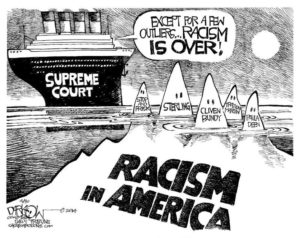Recent Young Adult Blog Posts
Statement supporting student activism on Gaza
The UU College of Social Justice, in collaboration with Side with Love and the Youth and Emerging Adult team of the Lifespan Faith Engagement office joins in solidarity with Unitarian Universalist young adults and students across the globe who are protesting the...
History is Never Undone
History, despite its wrenching pain,
Cannot be unlived, but if faced
With courage, need not be lived again.
– Maya Angelou, On the Pulse of Morning
One of the heaviest elements that comprise our identity is that of race. Race, as a social construct – not a biological one – was developed and maintained in ways that give privilege to those who identify as white, at the expense of people of color.

John Darkow, Columbia Daily Tribune
Whatever our individual racial and cultural backgrounds, Americans are shaped by a nation that was birthed not only from the lofty ideals of our Declaration of Independence, but also on the genocide of indigenous populations, the kidnapping and enslavement of Africans, and the dispossession of Mexicans. Many argue the US thrives off the continued oppression of people of color through practices within its financial system, health care, education, immigration, and politics, among many, many others.
Despite these serious challenges, countless individuals and groups have fought to confront and dismantle the unjust institutions and systems that exist in the US, and there is no question that progress has been made, especially in the past 60 years. But as the current Movement for Black Lives has highlighted, and as reflected in American society today, there is still a great distance still to go.
The legacies of American history live on all around us, as history is never “undone”; but we can draw inspiration and determination from those who struggled before us, as well as those who continue today to devote their lives to a vision of beloved community, undoing the systems and institutions of bias one at a time. We hope you will see some of this inspiring work within your internship placements.
“Beloved community is formed not by the eradication of difference, but by its affirmation, by each of us claiming the identities and cultural legacies that shape who we are and how we live in the world.” – bell hooks
We each engage from our particular starting points and perspectives, but regardless of how we identify, we can continue to deepen our understanding and analysis, as well as the courage and creativity we bring to the long struggle to dismantle racism. To that end, this unit is designed to give you different perspectives and resources.
READ: Colorlines & "I, Racist"
In Building a New Racial Justice Movement (Colorlines, August 2013), by Rinku Sen, the author outlines the need to call out racism as it exists in society, warns against the dangers of colorblindness in a movement centered on race, and highlights the importance of fighting for justice over civil rights.
I, Racist, by John Metta is a personal piece on why the author (a black man) struggles to speak to white people about race.
WATCH: Conversations and "White Privilege"
- A Conversation With Asians on Race (New York Times), 7:29
- White Privilege (note: trigger warning), 3:46
Additional Videos, if you have time – I promise they’re worth it!
- A Conversation With Latinos on Race
- A Conversation With Black Women on Race
- A Conversation With White People on Race
- A Conversation About Growing Up Black
REFLECT & SHARE
Questions:
- What, if anything, struck or moved you from the readings and videos above?
- How does the work of the organization with which you are interning relate to the continued struggle for racial justice? Are there manifestations of racism that the organization seeks to address and/or dynamics of white privilege that get in the way?
***
You’re welcome to share your thoughts on Facebook in a way that is most appropriate for you (essay, music, poetry, visual art, etc), but I also invite you to practice a different way of expressing yourself – through the six-word story:
Describe, using six words, what came to mind as you reviewed the materials in this reflection. The words don’t have to make up a sentence; they can be six independent words.
ADDITIONAL RESOURCES
Check out how The Movement for Black Lives tackles racial justice.
Just as we as individuals cannot separate our identities, you’ll notice within the Movement for Black Lives and others (like Cosecha), that many campaigns and organizations are multi-faceted, focusing not only on race, but also income inequality, citizenship, and gender, among many others.
If you identify as white, here are some resources to helping you think through how you can be involved in anti-racist organizing:
- How White People Can Support the Movement for Black Lives
- Protocol and Principles for White People Working to Support the Black Liberation Movement
- Tools for White Anti-Racist Organizing
There are so many good books written on racial justice, but here are a few which can get you started:
BONUS READING
Revolutionary Musings, by Barbara Ransby

